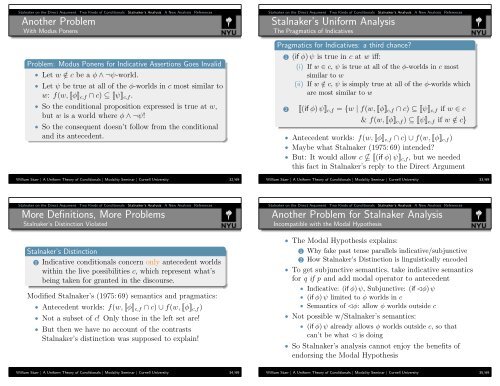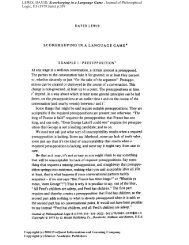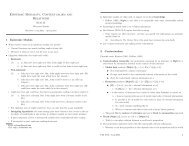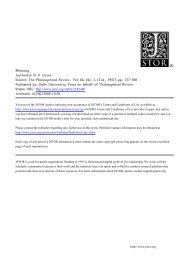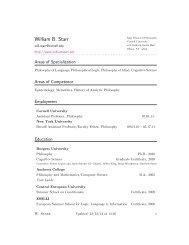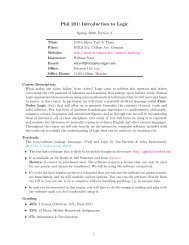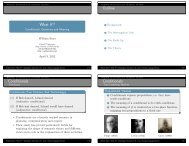A Uniform Theory of Conditionals: Beyond Stalnaker - Will Starr
A Uniform Theory of Conditionals: Beyond Stalnaker - Will Starr
A Uniform Theory of Conditionals: Beyond Stalnaker - Will Starr
Create successful ePaper yourself
Turn your PDF publications into a flip-book with our unique Google optimized e-Paper software.
<strong>Stalnaker</strong> on the Direct Argument Two Kinds <strong>of</strong> <strong>Conditionals</strong> <strong>Stalnaker</strong>’s Analysis A New Analysis References<br />
Another Problem<br />
With Modus Ponens<br />
Problem: Modus Ponens for Indicative Assertions Goes Invalid<br />
• Let w /∈ c be a φ ∧ ¬ψ-world.<br />
• Let ψ be true at all <strong>of</strong> the φ-worlds in c most similar to<br />
w: f(w, φ c,f ∩ c) ⊆ ψ c,f .<br />
• So the conditional proposition expressed is true at w,<br />
but w is a world where φ ∧ ¬ψ!<br />
• So the consequent doesn’t follow from the conditional<br />
and its antecedent.<br />
<strong>Will</strong>iam <strong>Starr</strong> | A <strong>Uniform</strong> <strong>Theory</strong> <strong>of</strong> <strong>Conditionals</strong> | Modality Seminar | Cornell University 32/69<br />
<strong>Stalnaker</strong> on the Direct Argument Two Kinds <strong>of</strong> <strong>Conditionals</strong> <strong>Stalnaker</strong>’s Analysis A New Analysis References<br />
<strong>Stalnaker</strong>’s <strong>Uniform</strong> Analysis<br />
The Pragmatics <strong>of</strong> Indicatives<br />
Pragmatics for Indicatives: a third chance?<br />
1 (if φ) ψ is true in c at w iff:<br />
(i) If w ∈ c, ψ is true at all <strong>of</strong> the φ-worlds in c most<br />
similar to w<br />
(ii) If w /∈ c, ψ is simply true at all <strong>of</strong> the φ-worlds which<br />
are most similar to w<br />
2 (if φ) ψ c,f = {w | f(w, φ c,f ∩ c) ⊆ ψ c,f if w ∈ c<br />
& f(w, φ c,f ) ⊆ ψ c,f if w /∈ c}<br />
• Antecedent worlds: f(w, φ c,f ∩ c) ∪ f(w, φ c,f )<br />
• Maybe what <strong>Stalnaker</strong> (1975: 69) intended?<br />
• But: It would allow c (if φ) ψ c,f , but we needed<br />
this fact in <strong>Stalnaker</strong>’s reply to the Direct Argument<br />
<strong>Will</strong>iam <strong>Starr</strong> | A <strong>Uniform</strong> <strong>Theory</strong> <strong>of</strong> <strong>Conditionals</strong> | Modality Seminar | Cornell University 33/69<br />
<strong>Stalnaker</strong> on the Direct Argument Two Kinds <strong>of</strong> <strong>Conditionals</strong> <strong>Stalnaker</strong>’s Analysis A New Analysis References<br />
More Definitions, More Problems<br />
<strong>Stalnaker</strong>’s Distinction Violated<br />
<strong>Stalnaker</strong>’s Distinction<br />
1 Indicative conditionals concern only antecedent worlds<br />
within the live possibilities c, which represent what’s<br />
being taken for granted in the discourse.<br />
Modified <strong>Stalnaker</strong>’s (1975: 69) semantics and pragmatics:<br />
• Antecedent worlds: f(w, φ c,f ∩ c) ∪ f(w, φ c,f )<br />
• Not a subset <strong>of</strong> c! Only those in the left set are!<br />
• But then we have no account <strong>of</strong> the contrasts<br />
<strong>Stalnaker</strong>’s distinction was supposed to explain!<br />
<strong>Stalnaker</strong> on the Direct Argument Two Kinds <strong>of</strong> <strong>Conditionals</strong> <strong>Stalnaker</strong>’s Analysis A New Analysis References<br />
Another Problem for <strong>Stalnaker</strong> Analysis<br />
Incompatible with the Modal Hypothesis<br />
• The Modal Hypothesis explains:<br />
1 Why fake past tense parallels indicative/subjunctive<br />
2 How <strong>Stalnaker</strong>’s Distinction is linguistically encoded<br />
• To get subjunctive semantics, take indicative semantics<br />
for q if p and add modal operator to antecedent<br />
• Indicative: (if φ) ψ, Subjunctive: (if ✁φ) ψ<br />
• (if φ) ψ limited to φ worlds in c<br />
• Semantics <strong>of</strong> ✁φ: allow φ worlds outside c<br />
• Not possible w/<strong>Stalnaker</strong>’s semantics:<br />
• (if φ) ψ already allows φ worlds outside c, so that<br />
can’t be what ✁ is doing<br />
• So <strong>Stalnaker</strong>’s analysis cannot enjoy the benefits <strong>of</strong><br />
endorsing the Modal Hypothesis<br />
<strong>Will</strong>iam <strong>Starr</strong> | A <strong>Uniform</strong> <strong>Theory</strong> <strong>of</strong> <strong>Conditionals</strong> | Modality Seminar | Cornell University 34/69<br />
<strong>Will</strong>iam <strong>Starr</strong> | A <strong>Uniform</strong> <strong>Theory</strong> <strong>of</strong> <strong>Conditionals</strong> | Modality Seminar | Cornell University 35/69


